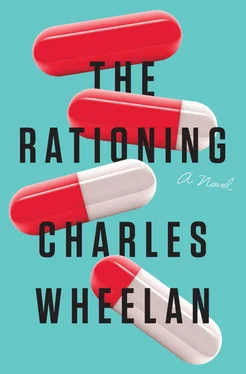“Obviously.”
“I’m sure it will be fine,” Goyal said earnestly. He really believed it. After all, the government had imposed ridiculous padding everywhere else in life. Did we really need to know that our coffee was served hot? Would drinking milk one day after the expiration date do any harm? Goyal testified that he had purchased a lawn mower with a warning telling him not to use it to cut his bushes. The expired aspirin in his cabinet seemed to work fine, year after year. What difference would a few months make for Dormigen?
A FEW MONTHS MAKES ALL THE DIFFERENCE, IT TURNS OUT. The FDA clinical trials had clearly established that seven months was the upper bound for the effectiveness of Dormigen and six months was the maximum recommended shelf life. Unlike aspirin, or even milk, Dormigen was alive. That is what made it such an extraordinarily effective drug. Dormigen was genetically engineered—human antibodies inserted into chicken embryos—and after about six months the medicine dies, literally.
Neither Goyal nor Swensen knew this, supposedly, which was the crux of their defense at trial. Neither was a genetic engineer; neither had any scientific training at all. In fact, not a single member of the Centera senior management had even a bachelor’s degree in one of the hard sciences. Much was made of this fact in the months after the Outbreak—“the bean counters had elbowed aside the scientists,” as the Atlantic described it. Much of this criticism misses the point, not because a science company does not need scientists in management, but because it lets the bean counters off too easy. There were thirty or forty scientists on the Centera payroll alone who could have told Goyal and Swensen that their plan would be deadly if the Dormigen doses were ever needed. Besides, one does not need a Ph.D. in virology to know that violating the terms of a contract with the federal government is a bad thing to do.
It is technically true that Goyal and Swensen did not willfully put the public at risk. They were not fully aware of what they had set in motion. The jury found this irrelevant. As the Washington Post–USA Today elegantly put it on the day of their conviction, “Neither Swensen nor Goyal knew that the gun was loaded when they pulled the trigger. But they also never cared to ask, which is just as awful in its own way.”
Goyal and Swensen did understand one thing: Dormigen takes twenty-one days to produce. No one had ever found a way to shorten this process, in part because there had never been any need. The process was cheap and easy and foolproof, if you have three weeks. “We have to make more,” a panicked Goyal told his CFO.
“I’ve already set that in motion,” Swensen said. The two men were hoping the expired doses of Dormigen would still prove effective. If not, they would have twenty million new doses in three weeks. One has to give Goyal and Swensen some credit. When they found themselves in a hole, they did stop digging.
Swensen figured, and Goyal concurred, that they could always stall the delivery to HHS by three weeks. It was the federal government, after all. There were two weekends and a state holiday in those twenty-one days. “So, worst-case, we deliver it a little late,” Goyal said, trying to reassure himself and Swensen. “Right?”
Under normal circumstances, he would have been correct. Of course, under normal circumstances, the federal government would not need twenty million extra doses of Dormigen.
PART 2

DO THE RIGHT THING
SO THERE WE WERE. THE SEVEN PEOPLE IN THE WORLD who appreciated the magnitude of what was happening: the President, his Chief of Staff, the President’s Strategist, the Majority Leader, the Secretary of Defense, the Director of the National Institutes of Health, and me—the person who supposedly knew more about lurking viruses than anyone else in the world. The President was sitting at his desk reading papers as we filed in. He was wearing reading glasses; I had never seen him in glasses before. I later learned that he did not like to be photographed with his glasses on because he felt they made him look old.
There was no grand plan for this first meeting. No one spent hours figuring out exactly who should be in the room. The President convened a small group of people with relevant expertise, and, more important, whom he trusted. The Secretary of Health and Human Services should have been there, but she had become embroiled in a scandal involving her private investments in a pharmaceutical company. She would resign two days later. The Attorney General should have been involved from the beginning, but he was attending a conference in South Africa on post-conflict justice and could not be called home without attracting undue attention. The head of the Centers for Disease Control (CDC) would later claim, rightfully, that he was excluded for political reasons from the early White House deliberations. He was a holdover from the previous administration whom the President never fully trusted (mostly because he had a habit of leaking self-serving information to the press). And so on.
Meanwhile, there were some people in the room who literally did not know the difference between a virus and a bacterium. The Majority Leader was there because the President wanted some representation from the legislative branch. He and the President had developed a strong working relationship. The Senate Majority Leader, a former funeral director from central Illinois, looked much less impressive in person than on television. He was short and fat—not middle-aged heavy, but fat. When he put on his suit jacket, one did not notice as much, but when he took off his jacket and sat down, his prodigious paunch sometimes made it hard for him to pull his chair all the way to the conference table. Funeral directors are often pillars of the community. The Majority Leader had started his political career on the school board before making the leap to the state legislature and then to Washington. He never finished college; no one in the Senate had ever confused him for the resident intellectual. If anything, he was quick to criticize the “pointy heads.” For all that, the Majority Leader was a brilliant politician, in the sense that he had a keen sense of the fears and hopes of people on the street. He was plainspoken, hardworking, and honest. In four decades of public life, he had made a lot of enemies, but no one had seriously accused him of breaking his word. Neither his friends nor his enemies ever doubted that he would use every tool in the legislative toolkit: flattery, bribery (the legal kind—a stadium here, favorable tax treatment there), persuasion, and threats (never idle).
The Majority Leader was a relatively new member of the Senate in 2024 when the final spasm of political realignment swept away what was left of the Republicans and Democrats. He was quick to jump on board with the New Republican Party, helping to shape it into the pragmatic, Main Street party that it is today. He could speak effectively, if not eloquently, about the needs and desires of small businesses and working people. “I don’t have much use for books, other than political history,” the Majority Leader told me once over a coffee break.
How does one respond to that? I was tempted to say, “If you read more books, you might understand the difference between a bacterium and a virus.” Or that when someone mentioned Willa Cather in the course of discussion, you would not ask, “Who is he?” The Majority Leader was also a big fan of simple solutions for complex problems. He was skeptical of “fancy studies,” as if there were some logical alternative for advancing the frontier of human knowledge.
Читать дальше













